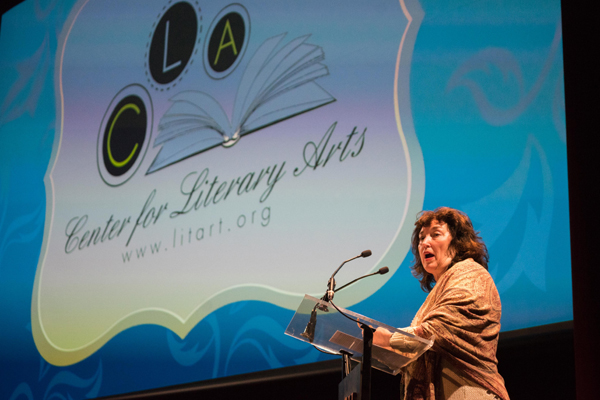
Cathleen Miller, associate professor of English at SJSU, will be the first Distinguished Chair of the Humanities at the University of Manchester in the United Kingdom. (Photo: James Tensuan, ’15 Journalism)
By David Goll
In a career already full of awards, honors and many accomplishments, Cathleen Miller, associate professor of English at San Jose State University, has received a prestigious Fulbright award and will conduct research into the phenomenon of women’s migration throughout the world.
As part of her honor from the J. William Fulbright Foreign Scholarship Board, Miller will serve as the first Distinguished Chair of the Humanities at the University of Manchester in the United Kingdom from September 2018 through March 2019. The university is the largest in the U.K., with 40,000 students.
“Just getting the award is an honor, but to be the first person to hold this position is an amazing feeling,” Miller said, of being selected for the award that has a lengthy application process. “I’m still totally shocked.”
Along with her research, Miller will participate in another first for the university: teaching its inaugural class in creative nonfiction writing. It is her specialty at SJSU, where she teaches in the Master of Fine Arts (MFA) program.
Miller has taught at SJSU since 2004, after teaching stints at the University of San Francisco and Moraga’s Saint Mary’s College of California. She also serves as editor-in-chief of the 151-year-old Reed Magazine, the oldest literary journal in the western United States. Since 2015, she has directed SJSU’s Center for Literary Arts, a program founded in 1986 that has brought five Nobel Prize winners, 16 winners of the National Book Award and 34 recipients of the Pulitzer Prize to campus.
Dr. Noelle Brada-Williams, chair of SJSU’s Department of English and Comparative Literature, was not surprised Miller won this award.
“I am so proud of Professor Miller becoming the first Distinguished Chair of the Humanities at the University of Manchester,” she said. “I think her Fulbright is very well-deserved. She has made a name for herself writing about the rights of women …”
“Miller’s research on migration couldn’t be more topical and timely,” Brada-Williams said, given the huge numbers of refugees generated by the Syrian civil war and exodus of Rohingya Muslims from Myanmar, among other conflicts. According to the United Nations, 255 million people migrate worldwide annually.
“I hope her work will help her readers understand the refugee experience and gain insight into what our collective responsibility is in responding to our shared humanitarian crisis,” Brada-Williams said.
Miller’s distinguished academic career might have come as a surprise to her grandfather, who was less than supportive when she declared during her rural Missouri childhood she wanted to attend college. Her grandparents ran a small post office and her father worked at the McDonnell Douglas aerospace manufacturing plant in St. Louis.
She did enter college, becoming an art major at Southeast Missouri State University. In mid-career, she earned a Master’s of Fine Arts degree from Pennsylvania State University.
In the tradition of Southern writers, Miller, who considers herself a daughter of the South, is a successful author whose work has been translated into 55 languages. Among her books is Champion of Choice, the 2013 biography of Dr. Nafis Sadik of Pakistan, former executive director of the U.N. Population Fund and special advisor to the United Nations secretary general who went on to be a special advisor to the UN secretary general and a special envoy for HIV/AIDS in Asia. Twenty years ago, Miller published Desert Flower, the story of Somali nomad Waris Dirie, who became a model, then an activist who shared her experience with female genital mutilation. It was later adapted as a feature film shown in 34 countries.
Miller is also a passionate travel writer whose work has taken her to more than 30 countries. Her work has appeared in the Los Angeles Times, San Francisco Chronicle, Chicago Tribune and Washington Post.
She’s most passionate about the welfare of women, especially those forced to leave their homes by war, political and economic strife. Miller said she looks forward to gaining a new perspective on the issue during her fellowship in England.
“I think the whole topic of migration in general is important to understand because it stems from widespread political and economic unrest, and is creating challenges in the nations on the receiving end as to how to accommodate and assimilate these populations arriving on their shores,” she said. “Women are much more vulnerable in this process — to exploitation, violence, sexual assault and trafficking, and we need to understand why they have risked so much to immigrate.”
In addition to her research, Miller remains a dedicated teacher. She wants her students to become marketable upon earning their degrees. She instructs them on how to compose book proposals for publishers, create business cards and have “author” pages on Facebook.
“We work on creating their identity as a writer,” she said.
She has a devoted following of current and former students.
“Professor Miller is present for her students,” said Sharon Simonson, a veteran journalist who served as managing editor of Reed Magazine. “She demands accountability, but she’s also nurturing. I think she has tremendous aspirations for SJSU’s MFA writers, which are expressed in her aspirations for the MFA program, Reed Magazine and the Center for Literary Arts.”